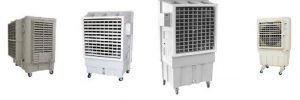
How Outdoor Air Coolers Work: Advanced Cooling Technology
Outdoor air coolers are sophisticated devices that cool air through specialized metal surfaces. The working principle relies on the temperature difference between the cooler’s surface and the ambient air. Following fundamental heat transfer principles, the heat from the air transfers to the refrigerant inside the cooling tubes, effectively reducing air temperature. When the surface temperature of the cooler drops below the dew point of the air being processed, water vapor in the air condenses, enhancing the cooling effect – particularly beneficial in Dubai’s humid climate conditions.Components and Structure of Professional Air Cooling Systems
Modern air coolers utilize ambient air as the cooling medium. The system’s fan forces air across finned tubes, allowing high-temperature process fluids to cool or condense. A complete air cooler unit consists of three primary components:- Finned tube bundle (heat exchange element)
- High-efficiency fans
- Structural framework
Environmental and Economic Benefits for Dubai Businesses
By using natural air as the cooling medium, these systems offer significant advantages:Environmental Benefits
- Conservation of valuable water resources
- Reduction in industrial wastewater discharge
- Protection of natural ecosystems
- Lower carbon footprint
Economic Advantages
- Lower initial investment costs
- Simplified operational procedures
- Reduced maintenance expenses
- Extended service life
- Energy efficiency
Industrial Applications Across the UAE
Air cooling systems serve critical functions in various industries throughout Dubai and the UAE, including:- Refineries and petrochemical plants
- Metallurgical operations
- Power generation facilities
- Manufacturing centers
- Air compressor intercoolers
- Gas turbine regenerators
- Generator cooling systems
- Waste heat recovery installations
Types of Air Cooling Systems
Air coolers are available in several configurations to suit different environmental conditions and cooling requirements:- Dry type: Uses only air for cooling
- Wet type: Incorporates water spray for enhanced cooling
- Hybrid (dry-wet): Combines both technologies for optimal efficiency
Key Advantages of Air Cooling Technology
Air cooling offers two significant advantages over alternative cooling methods:- First, air is an inexhaustible resource, ensuring continuous operation without supply concerns
- Second, air cooling eliminates issues related to salt dissolution that occur in other cooling processes